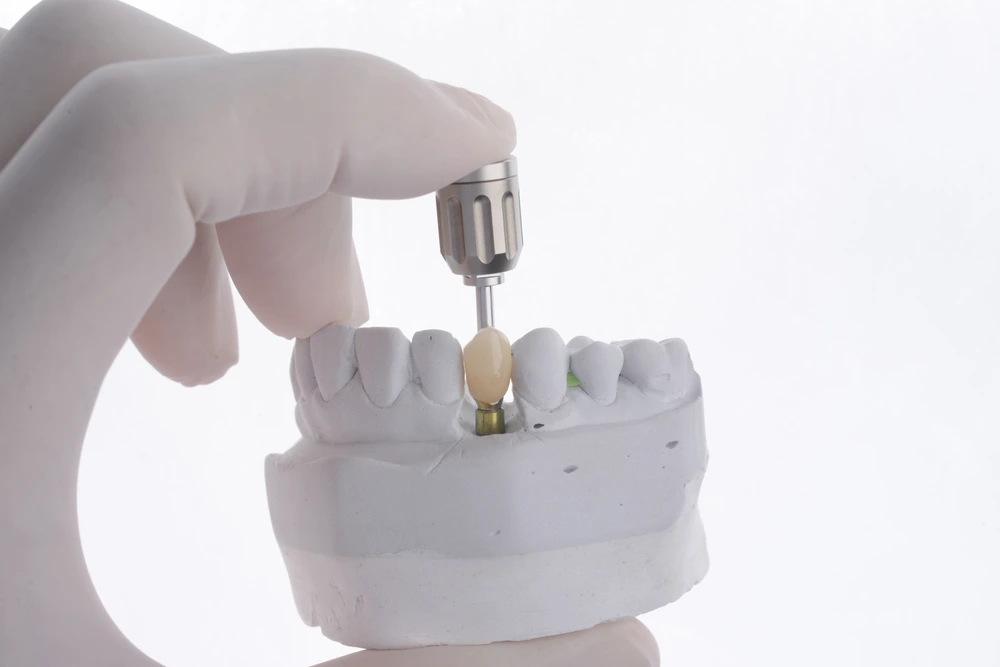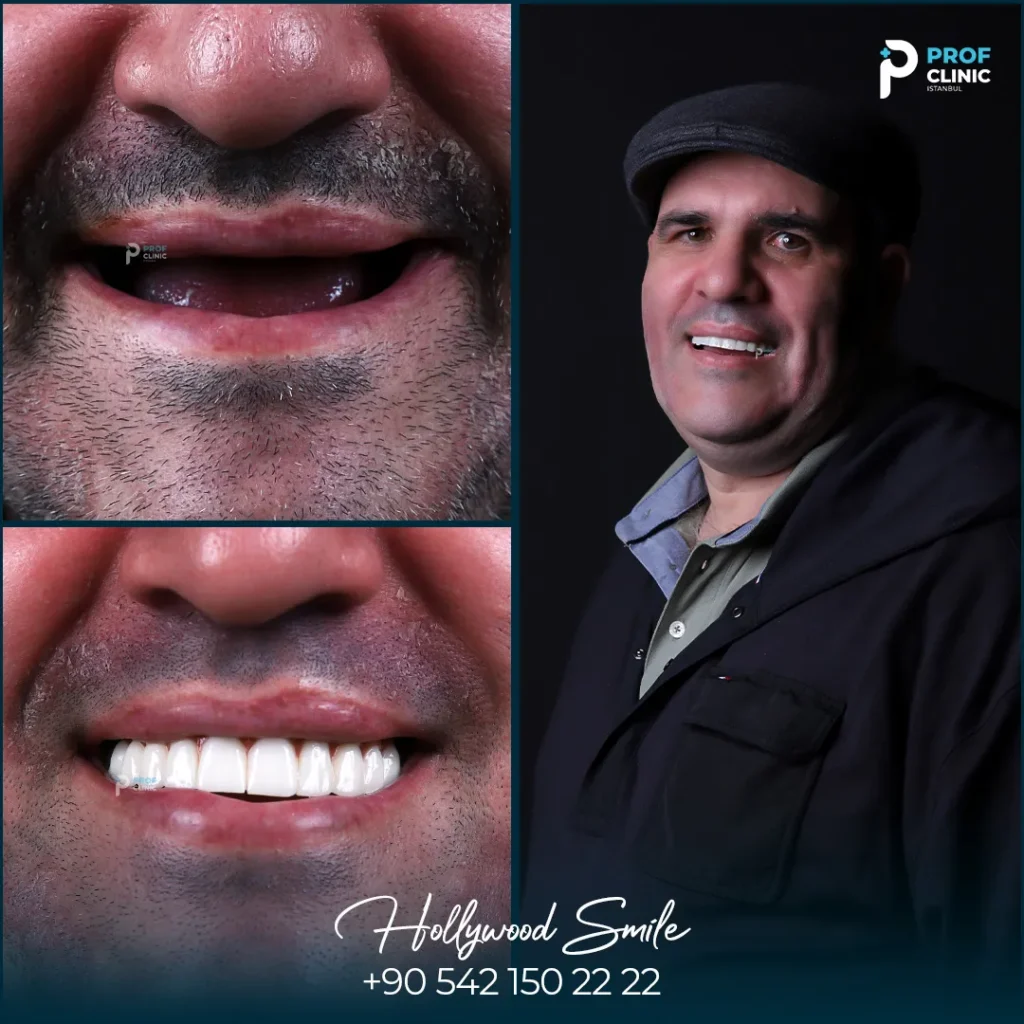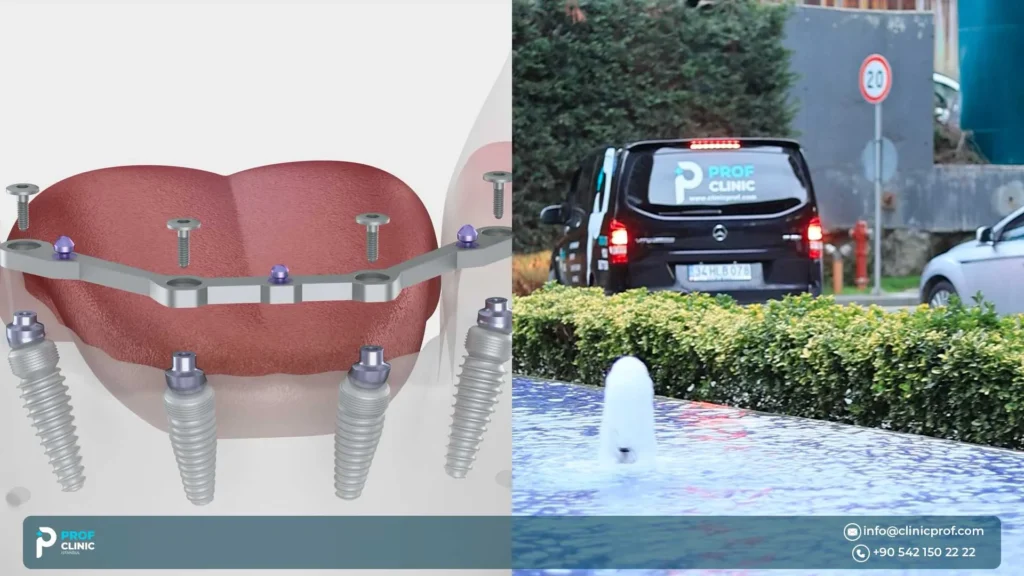Replacing missing teeth is no longer limited to traditional solutions. With advancements in dental implants and the variety of options available, you can now restore both the full functionality and aesthetics of your mouth.
Today’s article from Prof Clinic introduces you to the various types of dental implants, whether additional procedures may be required during implantation, and the costs associated with such a procedure. Keep reading to learn more.
Information About Dental Implants
At its core, a dental implant is an innovative restorative solution designed to restore the function and appearance of missing teeth by placing an artificial root into the jawbone. Typically made of high-purity Titanium, a biocompatible material, it possesses a unique ability to integrate seamlessly with body tissues through a biological process known as osseointegration.
The essence of a dental implant lies in its role as a solid, stable foundation that mimics the natural tooth root, enabling the secure attachment of a crown, bridge, or denture. This allows you to regain efficient chewing function and smile with confidence, free from worry.
Also Read: Define Dental Implant: Comprehensive Guide

Single Implants vs. Multiple Implants
When considering dental implants, selecting the type and number of implants primarily depends on the extent of your tooth loss. Understanding the differences between these two options is essential.
Single Implants
- Replaces a single missing tooth with a titanium implant and an independent crown.
- Provides a natural appearance without affecting adjacent teeth.
- Requires strong bone at the implant site.
- Costs more per tooth compared to multiple implants.
- Does not involve altering or shaping healthy teeth.
Multiple Implants
- Replaces several teeth or an entire jaw with bridges or dentures.
- Uses fewer implants to support larger restorations.
- Ensures strong stability for chewing and speaking.
- Reduces overall cost compared to implanting each tooth individually.
- May require bone grafting if the bone is weak.
To avoid confusion in making your choice, the team of dentists at Prof Clinic is here to guide you toward the best option for your case. Contact us now for a free consultation.
Also read: Dental Implants Without Surgery: Is It Possible?

Different types of Dental Implants
The most commonly used or specialized types of dental implants currently include:
Endosteal Implants
- The most widely used type globally.
- Placed directly into the jawbone, serving as a substitute for the natural tooth root.
- Suitable for most cases with sufficient jawbone volume and density.
Subperiosteal Implants
- Less common today compared to endosteal implants.
- Positioned on top of the jawbone surface, beneath the gum tissue.
- May be an option for cases with significant jawbone loss where bone grafting is not desired or feasible.
Zygomatic Implants
- A specialized type primarily used in the upper jaw.
- Anchored in the cheekbone (zygoma) rather than the upper jawbone directly.
- Employed in cases of severe, advanced upper jawbone atrophy when insufficient bone is available for traditional implants.
Immediate Load Implants
- Allow placement of a temporary crown immediately after the implant screw is inserted in the same session.
- Require strong bone and excellent initial implant stability.
- Reduce treatment time and provide rapid aesthetic results.
Mini Implants
- Smaller-sized implants often used to stabilize dentures.
- Installed with less complex procedures and lower costs than traditional implants.
- Ideal for narrow bone or temporary support in orthodontic treatments.
Also Read: What do dental implants look like?

Dental Implant Costs Per Type
As with any dental clinic or medical center, whether in Turkey or elsewhere, the cost of dental implants at Prof Clinic varies depending on the type of implant, the scope of treatment required, and any necessary supportive procedures.
- Single Dental Implants: The cost for a single implant (excluding the crown) ranges from €280 to €1,000.
- Zygomatic Implants: The cost, whether for a single implant or a full jaw, ranges from €2,250 to €11,500.
- All-on-4 Dental Implants: The cost for a single jaw starts at €3,900 and can reach €6,600.
- All-on-6 Dental Implants: The cost for a single jaw ranges from €4,600 to €8,800.
If you’re interested in getting an evaluation of your case and knowing the exact cost of the procedures you need, contact Prof Clinic in Turkey directly. Our team will provide you with comprehensive details about our services and pricing based on your personalized consultation.
Other Procedures You May Have With Implants
In many cases, ensuring the success of dental implants requires preparing the surrounding area to be strong and healthy. This may necessitate additional procedures depending on the condition of your jawbone and surrounding tissues. So, what are the most important of these procedures?
Bone Grafting
Performed when there is insufficient jawbone to provide adequate support for a dental implant. This involves adding bone material to rebuild the bone and ensure the implant’s stability and successful integration.
Sinus Lift
A type of bone grafting in the posterior upper jaw to increase its height. The sinus floor is elevated, and bone is added beneath it to create sufficient space for implant placement.
Gum Grafting
Used to increase the amount or thickness of gum tissue around the dental implant site. Aims to enhance the aesthetic appearance of the implant and protect it in the long term.
Sinus-Related Procedures
May be necessary in the upper jaw to ensure the health of the sinus before implantation. These include sinus lifts or addressing other issues to provide a suitable environment for the implant.
Temporary Crowns
Artificial teeth temporarily placed on dental implants during the healing period. They offer a partial aesthetic and functional solution and help shape the gum before the permanent crown.
Implant Removal
A surgical procedure resorted to in rare cases when the implant fails to integrate with the bone or complications arise. It involves removing the unsuccessful implant.
Also read: All-on-4 Dental Implants in Turkey: Cost & Advantages

Choose the Right Type for You with Prof Clinic
Selecting the optimal dental implant for your individual case necessitates a thorough evaluation and specialized expertise to ensure the best long-term outcomes. This is where Prof Clinic in Turkey plays a pivotal role, offering a highly qualified medical team equipped with the latest digital diagnostic technologies to assess your specific condition with exceptional precision.
We offer a comprehensive range of dental implant systems from globally recognized brands, enabling us to provide diverse treatment options tailored to the varying clinical and financial needs of our patients. These features ensure that you receive a comprehensive consultation and a personalized treatment plan to select the implant type that delivers the best possible results for your case.
Also read: What is the best option for your Dentures vs Veneers?
FAQs about types of dental implants:
What type of doctor does dental implants?
Dental implants are placed by dentists who have undergone advanced training in this field. These professionals often include oral and maxillofacial surgeons, periodontists, or general dentists with substantial experience and qualifications in implant dentistry.
What type of sedation is used for dental implants?
Dental implant procedures are most commonly performed under local anesthesia, which numbs only the surgical area while the patient remains conscious. In more complex cases or for patients experiencing significant anxiety, intravenous (conscious) sedation or, occasionally, general anesthesia may be employed.
What are the best type of dental implants?
There is no single type of implant that is universally considered the best for all patients; the optimal choice depends on your individual condition. The best implant type is determined by your dental specialist to align precisely with your jawbone condition, overall health, and specific treatment needs.
What are the 3 types of dental implants?
The most common classification of dental implants based on their placement in the jaw includes three primary types: endosteal implants, subperiosteal implants, and zygomatic implants.
Which is better, zirconia or titanium implants?
Both are reliable and biocompatible options. Titanium implants are the most widely used and have a well-documented long-term success rate. Zirconia implants are preferred for aesthetic reasons (due to their white color) or in rare cases of metal allergies. The choice between them should be made in consultation with your dentist, based on your specific situation.
Which dental implants last the longest?
The longevity of a dental implant primarily depends on excellent daily oral hygiene, regular check-ups, the patient’s overall health, and the precision of the implant placement and restoration. Endosteal implants placed in healthy bone and well-maintained can have very high survival rates lasting for several decades.
Is 60 too old for dental implants?
No, 60 is not too old. As long as you’re in good health with adequate bone density (or qualify for bone grafting), dental implants are safe and effective at any age—even into your 70s or 80s.
Can I get an implant 2 years after extraction?
Yes. You can get an implant years after extraction, but you may need a bone graft if significant bone loss occurred during the wait. A dental evaluation and 3D scan will confirm your readiness.
How many implants do you need for 4 missing teeth?
Typically, 2 to 4 implants are used:
- 2 implants can support a bridge replacing 4 teeth.
- 4 individual implants offer the most stability and function, especially for non-adjacent gaps.
The best option depends on gap position, bone condition, and budget.




